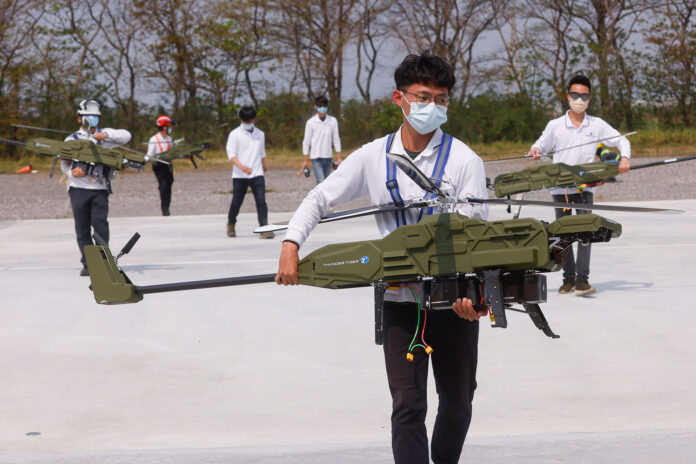Lessons from Ukraine, Anticipation in Taipei
Ukraine’s battlefield, once viewed as distant and exceptional, has become a brutal laboratory of modern warfare. Drones, cheap, ubiquitous, deadly, are reshaping how battles are fought and lost. Taiwan, under perpetual threat from Beijing and surrounded by a tightening noose of Chinese military drills, has decided to internalize the lesson. It now aims to produce 50,000 drones domestically within two years, betting everything on autonomy and survival.
In a modest Taiwanese classroom, far removed from the rubble of Bakhmut, former foreign legionnaire Chen Ting-Wei shares his combat experience in Ukraine. “Over 80% of infantry movements are spotted by drones before they even begin,” he warns. The battlefield is now a glass house.
Drone Warfare: The New Frontline Reality
For the first time this August, Taiwan’s military integrated drone training into the basic instruction of new recruits, marking a doctrinal shift too urgent to ignore. “You still need to shoot straight, but unless you know how to operate and evade drones, you won’t survive,” says Wang Ting-Yu, lawmaker for the ruling Democratic Progressive Party.
But a structural problem remains. The global drone market is dominated by China, whose companies like DJI and EHang supply even Western militaries. For Taiwan, using Chinese-made drones would amount to handing Beijing a remote kill switch. The solution: total decoupling.
Building a Domestic Defense Industry from the Ground Up
Taiwan’s government now plans to manufacture 50,000 drones free of Chinese components by 2027, a goal as political as it is technological. Few nations can pull off such rapid, autonomous defense scaling, certainly not without foreign help. But Taiwan is banking on its private tech sector: fast, skilled, and increasingly war-ready.
Hsuan Yuan Tech, a rising player, is positioning itself as the vanguard. CEO Donald Chou puts it plainly: “We already build civil-use drones. Now we know what specs a war drone needs. Ukraine gave us the blueprint.”
Taiwan’s pivot isn’t just military, it’s industrial. In a model reminiscent of Israel or South Korea, the island is shifting toward a civil-military fusion economy, where peacetime factories can become wartime arsenals at short notice.
A War Not Yet Declared, But Already Imagined
The 50,000 drone initiative is more than a message to Beijing, it’s a warning to Washington. In an era of shifting American commitments, from Kabul to Kyiv, Taipei understands that it cannot rely solely on foreign promises. Drones in hand are worth more than signed communiqués.
This is the new strategic realism: warfare will be tech-driven, asymmetric, and total. Those without drone swarms at launch time will be erased in the first phase, long before the first press conference in Washington.
Taiwan isn’t preparing for an invasion. It’s preparing for betrayal.



